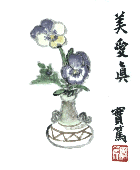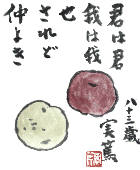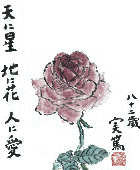
Atarashiki-mura
For my first year in Japan, I decided that I did not want to live as an ordinary salary-man and looked for alternatives. A friend who had been to an Israeli kibbutz told me they had heard there was one in Japan -- I checked, and found there were actually closer to 100 small cooperatives of various descriptions. None were based on the Jewish ideology of the kibbutzim, hardly surprisingly: some were new-age hippy communes; some were religious groups closer to monasteries; some were political (often communist) and some were materialistic. But one stood out for me: Atarashiki-mura, an artistic, anarchic, agricultural community founded by the Japanese author and painter Mushanokoji Saneatsu. I contacted the members and was eventually admitted as a "temporary member" for one year.
Mushanokoji (1885-1976) was a key member of the Shirakaba literary group, together with Shiga Naoya and Arishima Takeo. He originally created the "New Village" in 1918 in Hyuga (Miyazaki Prefecture), but in 1939 they were warned that much of their land was about to be submerged by the construction of a dam, so they searched for a new home and found it in Saitama. There are still a few members at Hyuga. Mushanokoji worked at the village for a while, but later found that he could help it more by working outside and supporting it with the income from his novels, plays and paintings. There has always been a strong artistic bent at the Mura and many well-known artists lived there or supported it as "external members", but most of the community's income now comes from agriculture.
Many people in Japan seem to think that Atarashiki-mura ceased to exist long ago -- even Kodansha's "Encyclopedia of Japan" claims that the "cooperative management [of Arishima Takeo's tenant farm in Hokkaido] … lasted until recent times. Its survival was in sharp contrast to the short-lived communal experiment of Mushanokoji Saneatsu". Maybe they ought to visit the mura sometime! It is however true that Atarashiki-mura is as susceptible to economic problems as anywhere else, and particularly to the risk of an ageing population, with too few young entrants. Just over a decade is left until its centenary, and it would be a great shame if the community did disappear, but I am not sure whether it is flexible enough to change with the times.
Links
The last page listed above contains a list of English translations of his work and studies; here are a couple of recent examples (for those which you can't find on Amazon or are out of print, try AbeBooks ). You can also use the box on the right to search Amazon JP for all Saneatsu works. ). You can also use the box on the right to search Amazon JP for all Saneatsu works.
- The Passion and three other Japanese Plays -
Amazon UK
- Long Corridor: The Selected Poetry of Mushakoji Saneatsu (trans. Robert Epp) -
Amazon UK
- Meeting the Sensei: The Role of the Master in Shirakaba Writers, by Maya Mortimer — Amazon USA
- Mushanokoji Saneatsu by Kanji Watanabe (in Japanese) -
Amazon USA
|
|
I've included a few of my favourite pictures by Mushanokoji Saneatsu below.
 |
"Beauty, Love, Truth." The relative merits of "Shin-Zen-Bi" (the true, the good and the beautiful) and their interdependency have often been debated in East Asia. Mushanokoji deliberately changed the emphasis from "good" to "love". |
 |
"You are you, I am I; still we are friends." Mushanokoji's emphasis on individuality did not make him very popular in Japan as it was seen as implying egoism, whereas he actually meant that every person had unique talents they should be free to develop, whilst respecting those of others. |
 |
"The heavens have stars; the earth has flowers; mankind has love." This again is quite a common phrase -- it featured in the theme music to the children's television series Jiraiya -- but although it allegedly came from Goethe I have been unable to track down the original. (If you recognize it please tell me!) |
This page produced by Ben Jones. For more information …
Home page (https://ozaru.net)
Japan page . Contact me



